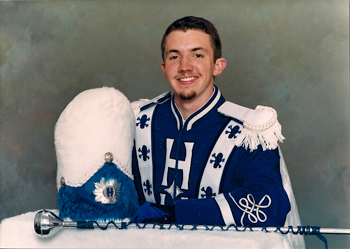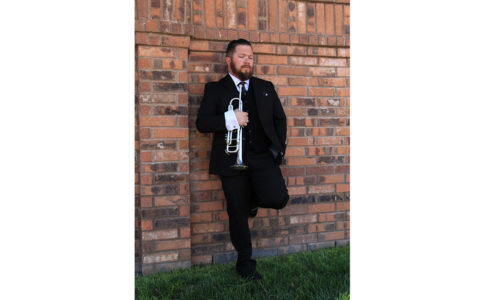Photo by O’Neal’s Studio
As a leader at an HBCU band, a white drum major must overcome stereotypes to earn respect and achieve his personal goals.
“Ay, check out that white dude!”
“Hampton’s recruiting white boys now? I knew y’all were struggling, but DANG!”
In my first game as a drum major, we faced one of our bitter rivals, Howard University, on its home turf. I was a proud member of the Hampton (Va.) University Marching Force, and both Hampton and Howard are HBCUs: Historically Black Colleges and Universities.
At that time, in 2001, you could find white members of Black college bands, but a white drum major was all but unheard of. Greene Stadium is in northwest Washington, D.C., and from the moment I stepped off the bus, people stopped, stared and shouted to their friends about me all the way through halftime.
At a Black college football game, almost every moment is an opportunity to play, dance, sing or chant, and the two bands battle back and forth the entire time. The movie “Drumline” only begins to tell the story of our pride.
During the first half, I focused intently on every movement, refusing to let their fans see me sweat, even while wearing a heavy wool uniform and cape with the heat index over 100.
Before every halftime performance, the Force rallies around the drum majors to get hype for the show, and our director— the late, great Barney E. Smart—sent me over to Howard’s home side to make sure we had enough room to circle up. Shako in one hand, mace in the other, I strolled past the home crowd stands, and my fluffy brown hair made it clear that I wasn’t just “light-skinned.” I heard every slur you could imagine, plus a few that seemed to be made up on the spot. I kept my game face on and eyes straight ahead; if ever there was a time to “leave it all on the field,” it was now.
We high-stepped and grooved through the show, and their fans were all about our dance routine. We “got house,” a better reaction from their home crowd than Howard’s band did. As we strutted back to the bleachers, past those same hostile fans, no one said a word as I passed. I felt vindicated, having dented those “white people can’t dance” stereotypes and getting some respect along the way.
Yet I had to literally put on a show to earn the right to be considered equal to my brothers and sisters in the band, and it gives me pause to know that there are many who must fight far harsher battles every day because of their ethnicities.
The Question
Whenever I mention that I went to an HBCU, a reaction is inevitable. I know what they really want to know: “So, why did you go to a Black school?”
For me, it wasn’t as difficult of a decision as people expect. I grew up right outside of Detroit, and most of my high school classmates and friends were Black. Our director, Ben McKnight, took us to competitions at Hampton, Virginia State and Florida A&M, and our band’s style emulated them. I had scholarship offers from quite a few schools—Hampton included—but I loved the Force, and I would be able to graduate in five years with both a bachelor’s and master’s degree.
Most of my friends and family members were supportive, but there were a few who tried to talk me out of going: “What if you’re the only white person?” “What if they don’t accept you?”
They realized that living in an HBCU environment would be uncomfortable for them and projected that onto me. I try to make choices based on my own values, passions and goals and not based on what others might think or expect of me. I never looked back.
The Lessons
The first time I tried out for drum major, I failed miserably; I didn’t even finish the warm-up run around campus on the first day. It would have been easy to give up, but we often learn more from failure than from success. You will make mistakes, and much of your legacy will be determined by how you move forward.
It is easy to let your ego get the best of you once you’re tapped for a leadership role. Remember that you have been promoted in rank and not in worth. The few moments of glory are far outweighed by the gritty day-to-day responsibilities of running the band, and you may be surprised by how much you must do that few others will witness. Humility and passion for servant leadership are what will ultimately endear you to your family in the ranks (but don’t forget you still have to kick the show!).
Hampton has one of the most moving alma maters I have heard, and after every game, the team, the fans and the band all link arms to sing together. The refrain continues to resonate with me:
“O Hampton, we never can make thee a song
Except as our lives do the singing,
In service that will thy great spirit prolong,
And send it through centuries ringing!”
To let your life do the singing is to lead by example in word and deed, to never compromise your values or your integrity, and to do the very best you can with what you’ve been given. To make these commitments is to be well on your way not only to success, but also to inspiring those you are charged to lead.
How’s your singing?
About the Author
Matt Smith performed in the Southfield (Mich.) High School Marching Blue Jays for four years and the Hampton University Marching Force for another four. He served as a drum major his senior year. He holds both a B.A. in Music (clarinet performance) and an M.A. in Teaching from Hampton University, is a member of Phi Mu Alpha Sinfonia, and is a Ph.D. candidate in Educational Leadership at the University of Nevada. Matt is working on a memoir about his time at Hampton.


